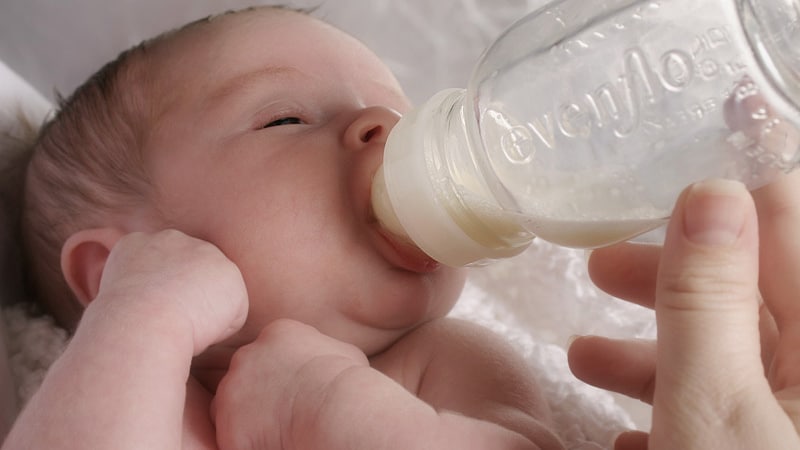The U.S. baby formula shortage appears to be growing worse and may remain that way for some time.
About 40% of U.S. baby formula supplies were out of stock at the end April, according to Datasembly, a retail tracking group. That’s up from 31% at the beginning of April.
“Unfortunately, we don’t see this slowing down any time soon,” Ben Reich, CEO of Datasembly, said in a statement.
“Inflation, supply chain shortages and product recalls have continued to bring volatility to the category and continues to be one of the most affected products in the market,” he said.
Overall, 26 states have out-of-stock rates of 40% to 50%. The states with the worst shortages – with out-of-stock rates of 50% or higher – include Texas, Tennessee, Missouri, Iowa, North Dakota, and South Dakota.
Some metro areas have even higher rates. The out-of-stock rate in San Antonio, TX, has climbed to 57%, while in Tennessee, rates in Memphis and Nashville have grown to 52%. In Houston and in Des Moines, IA, out-of-stock rates are at 50%.
The shortages are partially due to a recall this year by Abbott Nutrition, which is a major producer of baby formula. A key production facility in Michigan was shut down and is under investigation by the FDA and CDC after reports of contaminated formula that was linked to the deaths of at least two infants.
The recall included certain batches of Similac, Alimentum, and EleCare, which are major brands of powdered infant formula made by Abbott.
“The unprecedented scope of this infant formula recall has serious consequences for babies and new parents,” Brian Dittmeier, JD, the senior director of public policy at the National WIC Association,told The New York Times.
The National WIC Association is a nonprofit that provides education and support for the U.S. Food and Nutrition Service’s Special Supplemental Nutrition Program for Women, Infants and Children (WIC). Abbott Nutrition is the exclusive supplier for more than half of the WIC agencies nationwide, he said.
“Unlike other food recalls, shortages in the infant formula supply affects a major – or even exclusive – source of nutrition for babies,” Dittmeier said.
Major retailers, including CVS, Target, Walgreens, and Walmart, continue to limit formula purchases to between three and five units per transaction, according to CNN Business. Customers are posting images on social media of empty store shelves and signs with limits.
In mid-April, Abbott said in a statement that the company was working to increase the supply by focusing on formula production at other facilities and bringing in formula from Europe. On Saturday, the company told CNN Business that it is working with the FDA to resume operations at the Michigan plant.
“We continue to make progress on corrective actions and will be implementing additional actions as we work toward addressing items related to the product recall,” Abbott said.
What Parents Should Do
Parents have struggled to find formula this year, particularly formula for specific nutritional needs. Parents are driving to other states, asking for help on social media, and bartering with extra supplies, according to The Guardian.
The shortage has become so dire that Republican Sen. Tom Cotton of Arkansas called the situation a “national crisis” on Monday.
“The formula shortage is a national crisis, hitting poor moms and kids the hardest,” he wrote in a Twitter post. “The FDA needs to immediately step up, be transparent, explain how it will get production restarted, and give parents a timeline.”
In some social media groups, families are alerting each other about restocked inventory, bargains, and specialty formulas for allergies or certain health needs, the Times reported.
To help ease the impact of shortages, the American Academy of Pediatrics advises buying no more than a 10-day to 2-week supply of formula. The group also has tips for urgent situations:
-
Contact your pediatrician and ask if they can provide a can from a local formula representative.
-
Contact your local WIC office, which may be able to suggest places to check.
-
Look for formula at smaller retail and drugstores, which may not be out of supply when larger stores are.
-
Buy formula online from well-recognized distributors and pharmacies. But don’t import formula from other countries because it’s not FDA-reviewed.
-
For most babies, you can switch to any available formula, including generic store brands, unless the child requires a specific hydrolyzed or amino acid-based formula such as EleCare.
The American Academy of Pediatrics strongly recommends against several ideas, such as adding water to formula or making homemade formula. The group says:
-
Although it may be tempting to water down formula to stretch it out, never do that. Watering down formula is dangerous and can cause nutritional imbalances.
-
Don’t make homemade formula. Although online recipes may seem healthy or less expensive, they aren’t safe and don’t meet nutritional needs. Some infant deaths have been reported from using homemade formulas.
-
Milk and milk alternatives aren’t recommended. Plant milks, especially almond milk, are low in protein and minerals.
-
Toddler formulas aren’t recommended for infants. But if nothing else is available, toddler formula is safe for a few days for babies who are close to a year of age.
Sources
NBC News: “40 percent of America’s baby formula supplies are out of stock.”
The New York Times: “‘Please Help’: A Nationwide Baby Formula Shortage Worsens.”
CNN Business: “The baby formula supply problem is getting worse.”
Abbott: “Our Efforts to Address Infant Formula Supply.”
The Guardian: “‘It’s a nightmare’: baby formula shortage leaves US parents desperate.”
Twitter: @TomCottonAR, May 9, 2022.
American Academy of Pediatrics: “With the baby formula shortage, what should I do if I can’t find any?”
Source: Read Full Article
